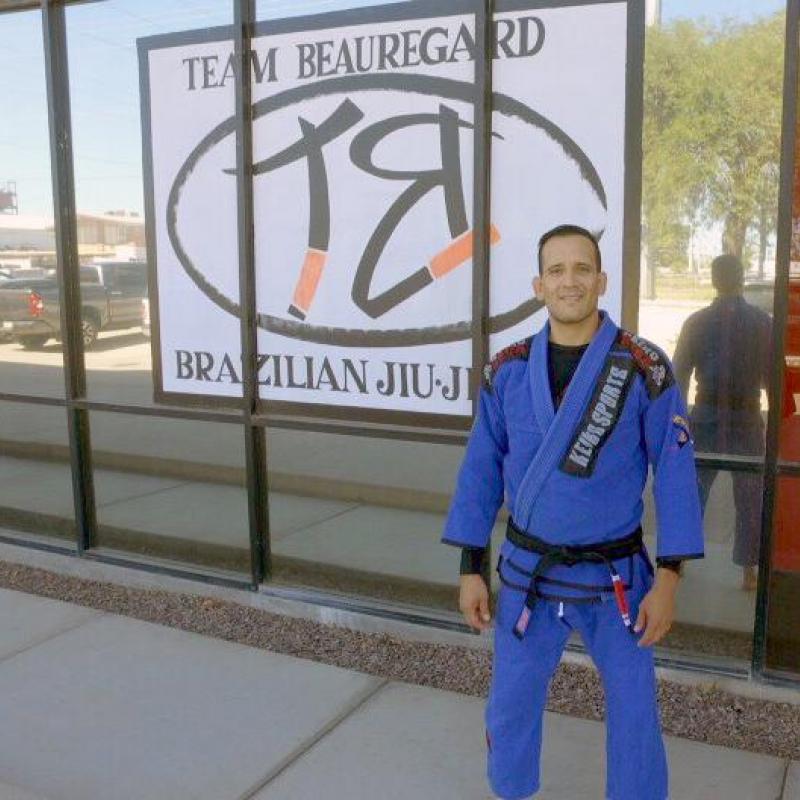By day, Cristian Lopez Villegas is a third-year graduate student at ASU, pursuing a doctorate in linguistics and applied linguistics. By night—or at least in his spare time—Lopez Villegas trains in the martial art of Brazilian jiu-jitsu.
Even after 18 years of practice, he still has passion for this combat sport that specializes in grappling and ground tackling.
“Brazilian jiu-jitsu changed my life,” he says.
Lopez Villegas’s introduction to the sport was serendipitous. The ASU graduate student started watching VHS tapes of Ultimate Fighting Championship (UFC), a mixed martial arts competition that includes Brazilian jiu-jitsu (BJJ) and other fighting styles. About the same time, a BJJ school opened in Orange County, CA, right up the street from where Lopez Villegas lived. He made a spontaneous decision to go to the gym.
“My brother and I, we walk in the gym and we just see all these ripped-up guys in speedos and we’re like ‘dude, this is weird,’” Lopez Villegas said. “But as we watched these guys spar, we were able to tell that it was real.”
From that moment, Lopez Villegas has dedicated himself to excelling in the martial art. One of his highest achievements was winning the bronze medal at the Brazilian Jiu-Jitsu World Championship in 2008.
Nowadays, Lopez Villegas’s passion for martial arts equals his passion for linguistics, which was ignited as he was pursued his undergraduate degree in Spanish. Lopez Villegas also has a master’s degree in sociolinguistics.
ASU’s doctoral program in linguistics and applied linguistics focuses primarily on human language and how it relates to the human condition. The curriculum, like any doctorate program, can be arduous, pushing students to their mental capacities. In these times, Lopez Villegas turns to the disciplines learned through BJJ.
What I noticed is that the best coaches are the ones who put their own butts on the line.
–Cristian Lopez Villegas
One of the biggest helps has been “that mental toughness of getting used to feeling overwhelmed,” says Lopez Villegas. “You learn to keep your mind calm and your thoughts positive.”
Lopez Villegas has also been able to integrate skills developed from jiu-jitsu into his teaching. He believes that practicing BJJ has helped him understand what drives people and how to push them to the next level.
“All of those drives, in reality—if you bring it back to primitive society—are really just a desire to survive,” he says. “When you’re in a fight, all of your emotions and adrenaline are at their highest levels. In order to be successful, you have to learn how to cope with that.”
In 2010, Lopez Villegas started his own Brazilian jiu-jitsu school in California. He shuttered the school before he moved to Arizona, but was able to transfer what he learned from teaching jiu-jitsu into his teaching of language.
“One of the things I do in my teaching is that I’m very cognizant of emotional aspects of [students’] learning,” he continued. “I know that if they feel a lot of anxiety and stress, their learning isn’t going to be as good. If they feel that their ideas are valued and that they are respected, they will express themselves more openly.”
What Lopez Villegas expects from all of his students, whether in the classroom or at the gym, is that they push themselves, especially when the going gets tough. At the same time, Lopez Villegas remembers that he wasn’t always the teacher. At one time, he was the one learning the hard lessons.
“What I noticed is that the best coaches are the ones who put their own butts on the line,” he says. “They need to lead by example.”
In two years, Lopez Villegas will receive his PhD from ASU, and he plans to continue his journey toward self-actualization after graduation.
“My main passions in life are martial arts and the studies of linguistics,” he says. “I would like to continue finding the balance between the two.”
—Josh Morris
Photo of Cristian Lopez Villegas by Josh Morris
